|
|
|
Sort Order |
|
|
|
Items / Page
|
|
|
|
|
|
|
| Srl | Item |
| 1 |
ID:
145105


|
|
|
|
|
| Summary/Abstract |
The 70th anniversary of the signing and entry into force of the UN Charter provided an occasion to explore the historical underpinnings of contemporary global governance. This article redresses the neglect of the United Nations as a multilateral structure before the conference that drafted the Charter in 1945. It rehabilitates an underappreciated aspect of the period that began on January 1, 1942, with the “Declaration by United Nations,” namely, the combination of multilateral strategies for military and human security to achieve victory in war and peace. The wide substantive and geographic resonance suggests the extent to which the pressures of the second war to end all wars helped states to overcome their disinclination to collaborate. Today’s fashionable calls for “good enough” global governance abandon the strategy of constructing robust intergovernmental organizations; they are not good enough, especially, because our forebears did much better. Many insights and operational approaches from 1942 to 1945 remain valid for addressing twenty-first-century global challenges.
|
|
|
|
|
|
|
|
|
|
|
|
|
|
|
|
| 2 |
ID:
079237
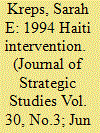

|
|
|
|
|
| Publication |
2007.
|
| Summary/Abstract |
Observers of United States (US) interventions have almost universally characterized the 1994 Haiti intervention as multilateral, a model for how international cooperation can achieve common security goals. A closer analysis of the intervention reveals that the planning and execution of the intervention were almost entirely unilateral and therefore cost the US few if any of the theoretical costs of coalition warfare, including interoperability and policy compromise. Mapped onto the unilateral strategy and operation of the intervention, however, was a multilateral diplomatic effort that secured United Nations Security Council authorization and provided a cover for an intervention that the US had already planned and intended to execute with or without that authorization. That the US sought a multilateral cover for an intervention that it could easily accomplish unilaterally shows the importance of two factors: A domestic audience that opposed unilateral peacekeeping but would accept using US resources as part of a broader multilateral operation, and a local population that would be more responsive to a multilateral coalition than a use of force that was perceived to be unilateral. The Haiti intervention shows that the determinants of success in operations other than war are as much political as military. When the US already has overwhelming military superiority vis-à-vis its adversary, building military coalitions becomes as much about enlisting political support as aggregating material capability.
|
|
|
|
|
|
|
|
|
|
|
|
|
|
|
|
| 3 |
ID:
052080
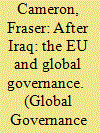

|
|
|
|
|
| Publication |
Apr-Jun 2004.
|
|
|
|
|
|
|
|
|
|
|
|
|
|
|
|
| 4 |
ID:
052135
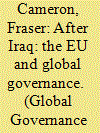

|
|
|
|
|
| Publication |
Apr-Jun 2004.
|
|
|
|
|
|
|
|
|
|
|
|
|
|
|
|
| 5 |
ID:
110828
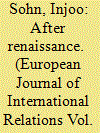

|
|
|
|
|
| Publication |
2012.
|
| Summary/Abstract |
Why does a re-emerging China pursue institutional strategies to expand its multilateral ties all over the world? This study explains the genesis of China's new multilateral diplomacy toward Africa, Latin America, and the Middle East. The central argument of the study is that many strands of structural arguments drawn from realist, liberal, and constructivist insights cannot provide complete explanations about China's multilateral activism without recourse to cognitive feedback dynamics. China fed its regional experiences of multilateralism back into its global policy formation. This experiment-based approach has been a pervasive feature in Chinese multilateral diplomacy as well as Chinese domestic reforms during the post-Mao period. The cognitive feedback model developed in this study intends to complement the prominent structural explanations by identifying micro-level dynamics and seeks to contribute to today's debate over power transition and international order.
|
|
|
|
|
|
|
|
|
|
|
|
|
|
|
|
| 6 |
ID:
113961
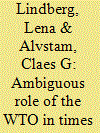

|
|
|
|
|
| Publication |
2012.
|
| Summary/Abstract |
The world trading system is characterized by a growing number of free trade agreements (FTAs). Limited progress in the negotiations at the multilateral level within the WTO has contributed to this development, inducing countries to seek faster, alternative ways to speed up liberalization, which make it possible to take advantage of preferential treatment with key trading partners. This article discusses what role the WTO should take with regard to FTAs in times of stalled multilateral negotiations and proliferating FTAs, and how FTAs can contribute to the multilateralization of regionalism. When results at the multilateral level are scarce, there may be a shift towards other alternatives in which the WTO is left out. This may force the WTO to function reactively, simply facing facts as an organization, rather than proactively, where it may play some role in shaping the FTA development. FTAs are not an entirely separate phenomenon from the WTO, since countries that negotiate FTAs play two roles. They are members of the WTO and as such are part of the work and negotiations of the organization. They are also part of trade arrangements that are limited to a smaller number of countries, and hence can negotiate against the interest of the entire multilateral organization. This article explores how these agreements can facilitate the work and negotiations of the WTO to regionalize bilateralism and multilateralize regionalism, here named the "sticky rice" approach. Various East Asian trade arrangements are used as empirical examples.
|
|
|
|
|
|
|
|
|
|
|
|
|
|
|
|
| 7 |
ID:
130243
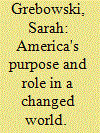

|
|
|
|
|
| Publication |
2014.
|
| Summary/Abstract |
I'll never forget my brief and ill-received show of American patriotism as a young expatriate in Beirut. It was the summer of 2010, and the city was teeming with convoys of Lebanese youth honking and waving flags to celebrate their favorite teams' victories in the World Cup. After an exciting win by the US, I joined a group of Americans in a street celebration. But cruising down the main thoroughfare of West Beirut, our procession of stars and stripes was met with disapproving looks. The image that remains with me to this day is that of an older man standing silently with his shoe in his hand. The tattered sole was pointed directly at us, an expression of disrespect in Muslim culture. We recognized the gesture's meaning only because a similar shoe had been thrown at the American president's head a year earlier.
Today's generation of young Americans, known as the millennials, has come of age at a time when America has been humbled on the world stage. Many of them have traveled extensively at a young age and experienced this diminished reputation firsthand. Their parents and grandparents believe that America has been a remarkable force for good in the world and that the country should not lose sight of its responsibility to shape events globally because of mistakes made in the last decade. But millennials seem more fixed on the limits of American power and disenchanted with ideas of American exceptionalism.
Because of these reservations, the millennial generation is often described as declinist or isolationist. I disagree. Young Americans care more than any other age group about what happens beyond our borders. Millennials tend toward multilateralism and the cautious use of force, and perhaps would be more selective in committing US resources overseas. But far from an abdication of global leadership, this prudence may prove to be the silver lining to millennials' crisis of confidence in America's role as, in President Obama's words, "not just a place on a map, but the light to the world."
|
|
|
|
|
|
|
|
|
|
|
|
|
|
|
|
| 8 |
ID:
083832
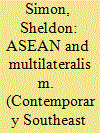

|
|
|
|
|
| Publication |
2008.
|
| Summary/Abstract |
Of the three Asian subregions -- Northeast, Southeast and South -- Southeast Asia is the only one that contains no Great Power. Yet Southeast Asian states have originated most Asian regional organizations, and Southeast Asian procedures acquired through ASEAN determine their processes. The "ASEAN Way", emphasizing consensus, non-interference in members' internal affairs and voluntary enforcement of regional decisions have characterized these bodies, insuring at bottom that they reinforce sovereignty protection. Nevertheless, ASEAN's expansion in the 1990s to include Vietnam, Laos, Myanmar and Cambodia incorporated states whose harsh domestic politics were seen by several of the Associations original members to be undermining its international stature. Additionally, coping with terrorism in the new century has also led to some erosion of the non-interference norm. Transnational cooperation is now essential to each nation's security because terrorist groups cross national borders, and egregious human rights practices in one country can lead to refugees fleeing into neighbouring countries. ASEAN's new November 2007 Charter constitutes an effort to move beyond sovereignty protection to economic, political-security and socio-cultural communities by 2020. The Charter also commits its signatories to democracy (for the first time) and human rights. Other regional organizations dominated by ASEAN procedures include the ASEAN Regional Forum (ARF) for security discussions, ASEAN+3 (Japan, South Korea and China) for economic matters, and the East Asia Summit (EAS) which added Australia, New Zealand and India to the ASEAN+3. Dialogues in these groups cover the gamut of Asian international relations. Perhaps their greatest utility is as venues for national leaders to discuss pressing issues on the sidelines of these gatherings.
|
|
|
|
|
|
|
|
|
|
|
|
|
|
|
|
| 9 |
ID:
052132
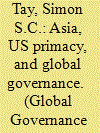

|
|
|
|
|
| Publication |
Apr-Jun 2004.
|
|
|
|
|
|
|
|
|
|
|
|
|
|
|
|
| 10 |
ID:
066780
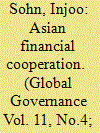

|
|
|
| 11 |
ID:
165155
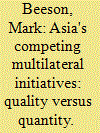

|
|
|
|
|
| Summary/Abstract |
East Asia has many distinctive features that set it apart from other comparable regions, not least attitudes to regional development and cooperation. Despite a growing number of regional initiatives in East Asia, however, they are generally distinguished by their ineffectiveness. It is entirely possible that ‘institutional balancing’, like its more well-known power balancing counterpart, is designed not to facilitate but to prevent something from happening. The sort of ‘multilateralism 1.0’ developed by the Association of Southeast Asian Nations (ASEAN) has a lot to answer for in this regard: having established its own pattern of institutional effectiveness ASEAN's ‘leadership’ has caused it to be replicated under the new wave of ‘multilateralism 2.0’. Consequently, I suggest that not only is China very comfortable with the idea of a rather feeble and ineffective institutional architecture, but the USA is also unlikely to do anything to change this picture, especially under a Trump administration that is highly skeptical about the efficacy of multilateral institutions at the best of times.
|
|
|
|
|
|
|
|
|
|
|
|
|
|
|
|
| 12 |
ID:
073210


|
|
|
| 13 |
ID:
184768
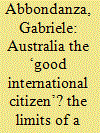

|
|
|
|
|
| Summary/Abstract |
Australia is often described as a ‘good international citizen’ (GIC), which is intertwined to its status of ‘quintessential’ middle power. However, a number of elements might undermine both notions. This research reviews the concept of GIC and contributes to this niche of IR theory by providing a dedicated definitional framework, which consists of: i) the respect of the international law; ii) multilateralism; iii) the pursuing of humanitarian and idealist objectives; iv) an active support for the rules-based order; and v) a congruous identity matched by consistent domestic policies. After assessing the country’s foreign and domestic policies against this, it finds that Australia has damaged its GIC credentials due to a number of reasons, including: the hard-line policies against seaborne asylum seekers; the participation in missions that are not sanctioned by the UN; the transformation of its global multilateralism into a selective regionalism; the budget cuts to foreign aid; a controversial attitude towards climate change mitigation; and a preference for the US-led global order over a rules-based international society. Far from criticising the country’s foreign policy in its entirety, it argues that in the 21st century Australia behaves as a ‘neutral international citizen’, and a traditional but not ‘quintessential’ middle power.
|
|
|
|
|
|
|
|
|
|
|
|
|
|
|
|
| 14 |
ID:
178851
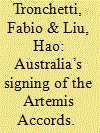

|
|
|
|
|
| Summary/Abstract |
On 15 October 2020, Australia signed the US Artemis Accords. Such a move was heralded as an important step towards promoting the Australian space program and enabling the country to take part in an ambitious space exploration venture. While not denying the importance of such a move, the present commentary analyzes it in a critical manner by assessing its legal and diplomatic implications. Taking into account Australia’s prior membership of the 1979 Moon Agreement and the discrepancies that exists between the Agreement’s provisions and those of the Artemis Accords, the present commentary not only views Australia’s simultaneous membership of both instruments as problematic but also considers it not sustainable in the long term. Based on these considerations, this commentary recommends Australia to either reconsider its membership to the Moon Agreement or, at least, to clarify how the two instruments may co-exists from a legal and political perspective.
|
|
|
|
|
|
|
|
|
|
|
|
|
|
|
|
| 15 |
ID:
173187
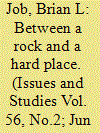

|
|
|
|
|
| Summary/Abstract |
“Middle powers,” variously defined, have served relevant and significant roles in the post-WWII regional and global orders, facilitated by structural conditions of “long peace” among great powers and proactive leadership by and among creative middle powers. Within the complex Asia-Pacific security order, “middle powers” such as Australia, Canada, and South Korea have had the “space” to engage the non-like minded and advance multilateralism with security guarantees from the US. However, Beijing and Washington today are eliminating this space and its associated choices for middle-power diplomacy by increasingly characterizing their rivalry as a confrontation of “existential threats” between incompatible “civilizations” and securitizing trade and technology. China and the US are each selectively ignoring or purposely eroding key aspects of a rules-based international order. This paper highlights the dilemmas of South Korea, Australia, and Canada, middle powers who have found themselves individually and collectively “stuck” facing contradictory global and regional policy choices.
|
|
|
|
|
|
|
|
|
|
|
|
|
|
|
|
| 16 |
ID:
116684


|
|
|
|
|
| Publication |
2012.
|
| Summary/Abstract |
This article focuses on the financial sanctions adopted by the European Union (EU) against individuals suspected of involvement in terrorist activities. This sanctions regime has been sharply criticised for its negative impact on human rights and has seen several judicial challenges before the European Courts. In contrast with most of the existing literature, which focuses on legal issues or examines the consequences of the EU financial sanctions, this article takes a step back to examine the reasons for which the EU decided to adopt these controversial financial sanctions in the first place. This article argues that it is mainly its commitment to 'UN-centred effective multilateralism' that has led the EU to adopt these financial sanctions measures in order to align itself with the UN financial sanctions regime. However, the Kadi landmark ruling of the European Court of Justice (ECJ) has challenged the pre-eminence of multilateralism over other considerations, such as the respect for human rights. As the Court of Justice prepares to hand down its second judgment in this case, the EU is left torn between its commitment to multilateralism and its commitment to human rights, which can be fully reconciled only if the UN sanctions regime meets the EU's human rights standards.
|
|
|
|
|
|
|
|
|
|
|
|
|
|
|
|
| 17 |
ID:
067772
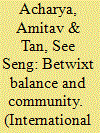

|
|
|
| 18 |
ID:
101377
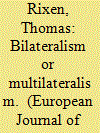

|
|
|
|
|
| Publication |
2010.
|
| Summary/Abstract |
Why do states cooperate bilaterally or multilaterally? This article addresses the issue using the example of international double tax avoidance. It is argued that double tax avoidance exhibits the strategic structure of a coordination game with a distributive conflict. The distribution of tax revenues depends on the asymmetry of investment flows between treaty partners. Since investment flows are defined dyadically, bilateral bargaining can best accommodate countries' concerns for the distribution of tax revenues and other economic benefits connected to the tax base. Moreover, because there are no serious externality problems with bilateral agreement, this solution is also viable. At the same time, there is a need for a multilateral organization to disseminate information and shared practices in the form of a model convention that provides a focal point for bilateral negotiations. This solution minimizes transaction costs. Since agreements are self-enforcing in coordination games there is no need for third-party enforcement. Instead, the Mutual Agreement Procedure (MAP) is a device to address problems of incomplete contracting.
|
|
|
|
|
|
|
|
|
|
|
|
|
|
|
|
| 19 |
ID:
061222


|
|
|
|
|
| Publication |
Jan-Apr 2005.
|
| Summary/Abstract |
The Japanese government today is actively and strategically choosing among various institutional forums to deal with its trade partners, namely bilateral venues, multilateral settings, and even preferential regional arrangements. This ongoing high-profile institutional selection is somewhat unprecedented for Japan, and demands a review of the historical and analytical reasons that drive decisionmakers to select one forum over another. Overall, the Japanese case suggests that the aggregate trade forum choices are influenced both by the desire to institutionalize mechanisms for stabilizing a range of expectations and by the necessity of guaranteeing market access and protection of investment in the fastest time possible.
|
|
|
|
|
|
|
|
|
|
|
|
|
|
|
|
| 20 |
ID:
184661


|
|
|
|
|
| Summary/Abstract |
Earmarked funding to international organizations (IO s) has increased significantly over the past two decades. International relations scholars have examined the causes of this trend, but know less about its effects on UN entities. This article identifies different types of earmarked funding, varying from low to high discretion delegated to IO s. Secondly, it examines trends in the UN Development Programme and UN Children’s Fund and finds that both have significant proportions of earmarked funding with low discretion. Drawing on thirty interviews, the article notes four implications of tightly earmarked financing: 1) higher transaction costs for IO s; 2) less predictable funding; 3) overhead costs that are rarely covered; and 4) increasing competition for financing. Overall, the article highlights that earmarked financing exists on a spectrum from tight to minimal control by donor states, and this has important implications for multilateralism.
|
|
|
|
|
|
|
|
|
|
|
|
|
|
|
|
|
|
|
|
|